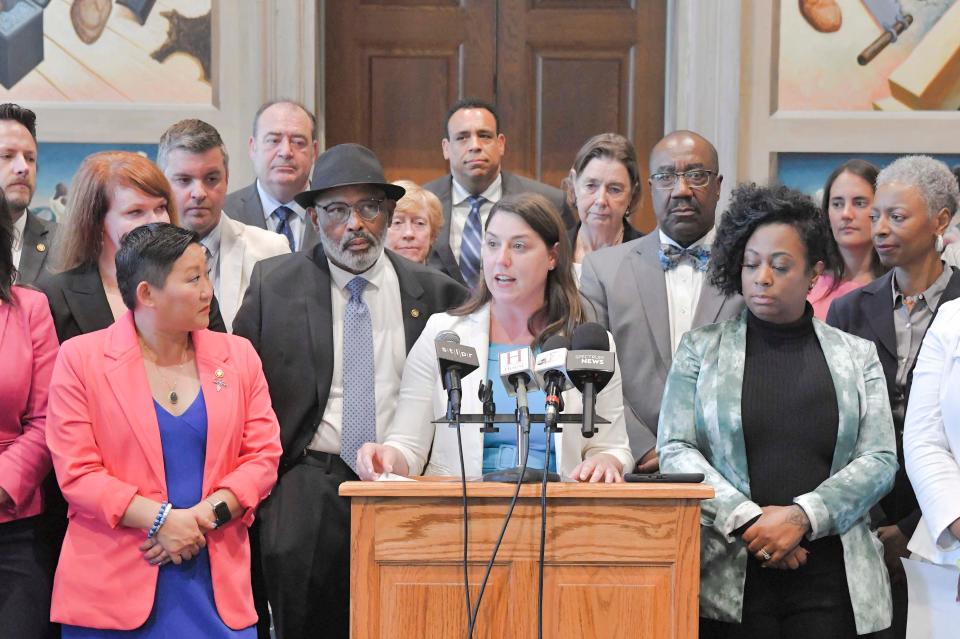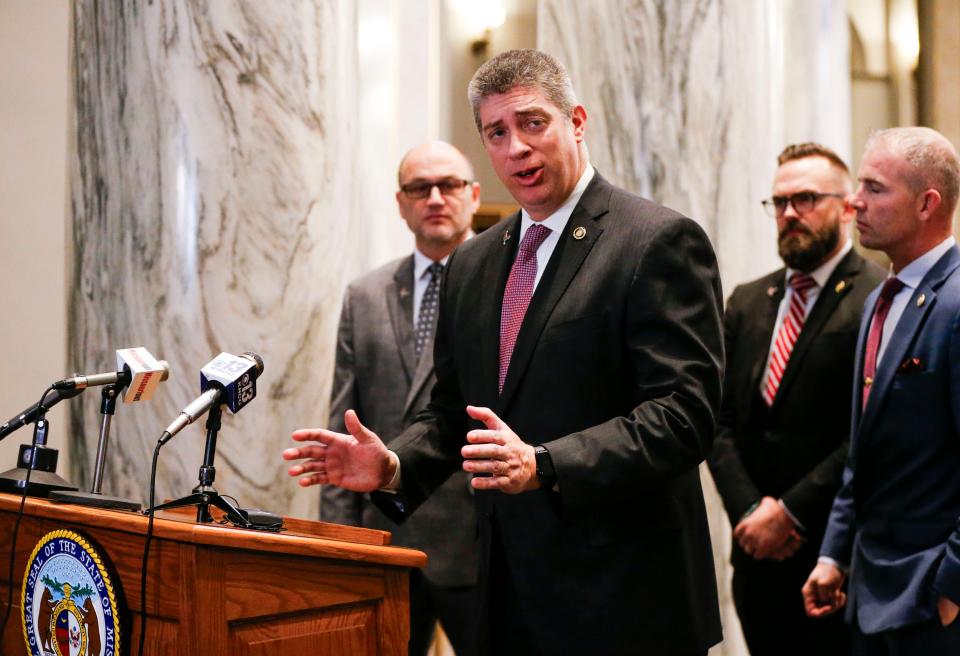The 2024 legislative session is over, but some lawmakers expect a special session
- Oops!Something went wrong.Please try again later.
Friday marked the end of the 2024 session for Missouri's legislature, which passed the fewest bills in any year in recent memory that were not appropriations bills. There were 28 non-budget bills passed.
However, of the 18 appropriations bills that were passed, some lawmakers raised concerns that the legislation funding the state budget is lacking enough funds to keep all of the state departments operational through the upcoming fiscal year.
Lawmakers approved a $51.7 billion budget on May 10, sending it to the governor to review. This year’s budget process drew bipartisan criticism due to closed door negotiations between House Budget Chair Cody Smith and Senate Appropriations Chair Lincoln Hough to decide the final spending totals.
Because of this, lawmakers in the House and Senate shared their displeasure during the rushed floor debate on the budget bills, though most voted to pass the legislation. The only constitutional duty of the Missouri General Assembly is to approve a state budget for the fiscal year that begins on July 1.

House Minority Floor Leader Crystal Quade is confident lawmakers will have to reconvene, echoing comments made by Gov. Mike Parson, who said that he wouldn’t kick the can down the road for his successor to have to address when the winner of this year’s gubernatorial election takes office, as reported by the Missouri Independent.
“We will be back here for a special session to have an emergency supplemental,” Quade said. “Whether that's before the end of the year or not, I don't know, but the governor has already said it's gonna have to happen.”
When asked about the prospect of a special session to further fund the government, House Speaker Dean Plocher was open to the idea, if the governor decides it is necessary.
"Well, that's the million-dollar question I guess," Plocher said. "We funded a budget that will, we believe, hold over through the year. But we're open to suggestions as we need to be. We will engage in conversations with the executive branch and the governor on that."
Senate Minority Leader John Rizzo thinks a special session will need to happen before the end of the year, “before the departments run out of money, because they will.”
Rizzo said its “only a matter of time,” and that many state departments that the Senate Democrats had spoken with indicated that they would be lucky to make it to January.
Rizzo said he thinks the underfunding was done by design, in light of the practice of tying conservative priorities to must-pass issues, as was done in the past with the federal reimbursement tax being tied to defunding abortion providers from receiving Medicaid funding.
“What's going to end up happening is you're going to have the bandits come back again, and try to leverage that,” Rizzo said. “They're going to know that the departments need the money to keep things going. They're going to make up things as to why we shouldn't fund them, and I'm sure they'll make it into a pro-life thing or a gun thing.”
He fears that the Missouri General Assembly has taken notes from the budget process in the U.S. Capitol, where lawmakers keep funding continuing resolutions to temporarily fund government operations, rather than passing a spending package to fund an entire fiscal year.
“It does worry me that we're falling into this Washington, D.C.-style budgeting trap where they tend to have a continuing resolution every 30 to 60 days,” Rizzo said. “Then there's a showdown and it just becomes these theatrics.”

When State Sen. Bill Eigel, a member of the Missouri Freedom Caucus and gubernatorial candidate was asked about a special session to pass a supplemental budget, he seemed to think that the issue was improper use of the funding that was already allocated.
“My goodness, we didn't spend enough money?” Eigel said. “I mean, we've doubled the state budget (in recent years), and we haven't spent enough money?”
“If there is such a need for the basic services of these departments to be funded, maybe we shouldn't, and maybe we should have cut out some of the fat that was going to some sports teams, for tens of millions of dollars. Maybe we didn't need a synthetic meat laboratory to compete with our cattle ranchers, but we didn't address any of that,” Eigel said.
This budget passed by state lawmakers was $1 billion less than the budget proposed by Parson. While the governor does not have the authority to add items to the budget, he does have the ability to veto some or all of any item included in the state budget.
What is included in the budget passed by state lawmakers?
While this budget is smaller that the 2024 operating budget that expires June 30, many of the spending decreases are due to a reduction in one-time spending projects, rather than a decline in funds needed for operating state departments.
One major feature of the budget is the $727.5 million allocated for improving I-44, including the addition of six lanes in Springfield, Joplin and Rolla.
Other road improvements are being funded across the state, including $100 million for rural and low volume roads, $53 million for I-29 and I-35 improvements and $60 million for Highway 67 improvements in Southeast Missouri.
The budget provides $8 million to fund Missouri National Guard troops currently working alongside the Texas National Guard in Operation Lone Star, an operation aimed at securing the nation’s southern border.
To support local military training, the state budget provided $7.5 million for an aircraft maintenance facility at Rosecrans Air National Guard Base, located in St. Joseph.
Conservative lawmakers celebrated the passage of legislation that attempts to block abortion facilities and their affiliates, such as Planned Parenthood, from receiving Medicaid funding. Although abortion is illegal in Missouri, this is the third time that lawmakers have tried to block any entity affiliated with the practice from receiving state funds.
On a similar note, lawmakers included $2 million for grants to crisis pregnancy resource centers, which are facilities aimed at helping pregnant women obtain aid needed to support themselves and their child when it is born.
Also included in the state budget is $1.5 billion toward expanding broadband access in Missouri.
The budget included $120.6 million increase to fully fund the K-12 education foundation formula and $14 million increase to fully fund school transportation. Lawmakers also passed an omnibus education bill this year, with a fiscal note of more than $467 million when fully implemented. It is unclear the impact this may have on the 2025 fiscal year budget.
This article originally appeared on Springfield News-Leader: Lawmakers predict special session for supplemental budget this year

